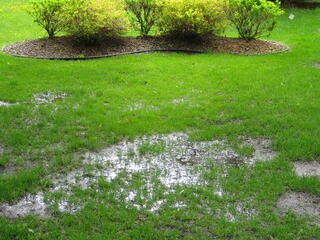A Saturated Ground Impacts Your Septic Tank’s Performance
Clayton County Water Authority (CCWA) officials are reminding septic tank owners of the impact a saturated ground has on their septic tank’s performance. Most of the septic system is sealed and unaffected by heavy rain, but one part — the drain field — is not, and a heavy rain can affect it. With the ground completely saturated from recent rains, you may experience the symptoms of a blocked septic system. The best course of action is to reduce water consumption in the house until things dry out.

Saturated ground can cause ponding around septic tank drain fields.
Symptoms of a Flooded Septic System
As the soil in the drain field becomes saturated, septic water can’t soak in, and it may rise to the surface and create an odor. As the condition worsens, water backs up into the tank, and if you have a transfer pump, the pump may start running continuously. Eventually, because the water has nowhere else to go, it ends up in your plumbing. You’ll notice slow draining, poor toilet flushing and, in extreme circumstances, overflow from floor and shower drains and even from toilets on the ground floor.
Here are a few tips to reduce your risk of potential problems:
- Be sure to spread out daily laundry, only run full loads.
- Conserve water by limiting your dish washing to full loads
- Do not take long showers
- Avoid taking baths
- Run only full dishwashers
- Don’t continually run the water while doing dishes or brushing teeth
- Use efficient heads on showers
- Use low flow toilets
- Turn off your sprinklers (sounds like an obvious one, but many have theirs on a schedule and forget to do this)
Septic tanks are not part of CCWA’s sanitary sewer system. Therefore, property owners are responsible for maintaining their septic tanks. For more information on septic tank maintenance, visit Clayton County Public Health’s website.


